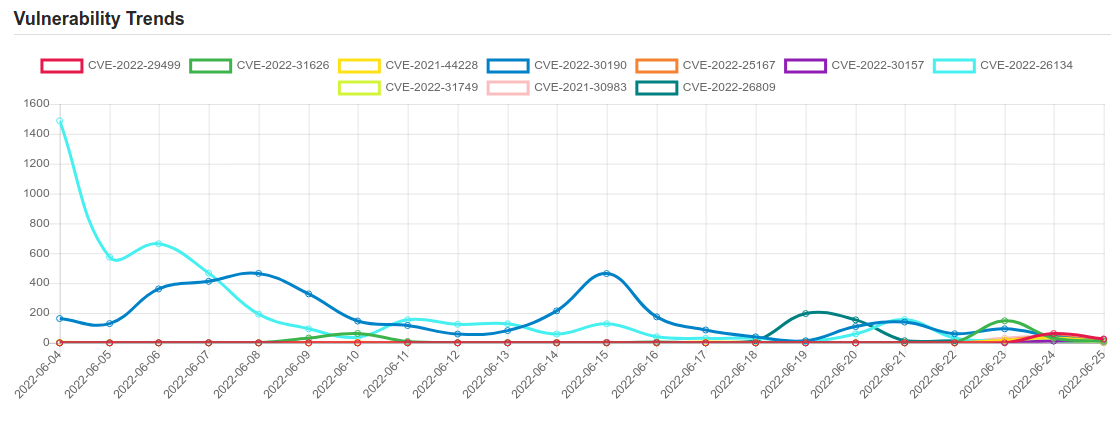Daily Vulnerability Trends: Sun Jun 26 2022

| CVE NAME | CVE Description |
| CVE-2022-34305 | In Apache Tomcat 10.1.0-M1 to 10.1.0-M16, 10.0.0-M1 to 10.0.22, 9.0.30 to 9.0.64 and 8.5.50 to 8.5.81 the Form authentication example in the examples web application displayed user provided data without filtering, exposing a XSS vulnerability. |
| CVE-2022-22980 | A Spring Data MongoDB application is vulnerable to SpEL Injection when using @Query or @Aggregation-annotated query methods with SpEL expressions that contain query parameter placeholders for value binding if the input is not sanitized. |
| CVE-2022-32405 | Prison Management System v1.0 was discovered to contain a SQL injection vulnerability via the ‘id’ parameter at /pms/admin/prisons/view_prison.php:4 |
| CVE-2021-21551 | Dell dbutil_2_3.sys driver contains an insufficient access control vulnerability which may lead to escalation of privileges, denial of service, or information disclosure. Local authenticated user access is required. |
| CVE-2022-21445 | Vulnerability in the Oracle JDeveloper product of Oracle Fusion Middleware (component: ADF Faces). Supported versions that are affected are 12.2.1.3.0 and 12.2.1.4.0. Easily exploitable vulnerability allows unauthenticated attacker with network access via HTTP to compromise Oracle JDeveloper. Successful attacks of this vulnerability can result in takeover of Oracle JDeveloper. CVSS 3.1 Base Score 9.8 (Confidentiality, Integrity and Availability impacts). CVSS Vector: (CVSS:3.1/AV:N/AC:L/PR:N/UI:N/S:U/C:H/I:H/A:H). |
| CVE-2022-32396 | Prison Management System v1.0 was discovered to contain a SQL injection vulnerability via the ‘id’ parameter at /pms/admin/visits/manage_visit.php:4 |
| CVE-2022-2104 | The www-data (Apache web server) account is configured to run sudo with no password for many commands (including /bin/sh and /bin/bash). |
| CVE-2022-29582 | In the Linux kernel before 5.17.3, fs/io_uring.c has a use-after-free due to a race condition in io_uring timeouts. This can be triggered by a local user who has no access to any user namespace; however, the race condition perhaps can only be exploited infrequently. |
| CVE-2022-32136 | In multiple CODESYS products, a low privileged remote attacker may craft a request that cause a read access to an uninitialized pointer, resulting in a denial-of-service. User interaction is not required. |
| CVE-2022-1116 | Integer Overflow or Wraparound vulnerability in io_uring of Linux Kernel allows local attacker to cause memory corruption and escalate privileges to root. This issue affects: Linux Kernel versions prior to 5.4.189; version 5.4.24 and later versions. |
| CVE-2022-29499 | The Service Appliance component in Mitel MiVoice Connect through 19.2 SP3 allows remote code execution because of incorrect data validation. The Service Appliances are SA 100, SA 400, and Virtual SA. |
| CVE-2022-31626 | In PHP versions 7.4.x below 7.4.30, 8.0.x below 8.0.20, and 8.1.x below 8.1.7, when pdo_mysql extension with mysqlnd driver, if the third party is allowed to supply host to connect to and the password for the connection, password of excessive length can trigger a buffer overflow in PHP, which can lead to a remote code execution vulnerability. |
| CVE-2021-44228 | Apache Log4j2 2.0-beta9 through 2.15.0 (excluding security releases 2.12.2, 2.12.3, and 2.3.1) JNDI features used in configuration, log messages, and parameters do not protect against attacker controlled LDAP and other JNDI related endpoints. An attacker who can control log messages or log message parameters can execute arbitrary code loaded from LDAP servers when message lookup substitution is enabled. From log4j 2.15.0, this behavior has been disabled by default. From version 2.16.0 (along with 2.12.2, 2.12.3, and 2.3.1), this functionality has been completely removed. Note that this vulnerability is specific to log4j-core and does not affect log4net, log4cxx, or other Apache Logging Services projects. |
| CVE-2022-30190 | Microsoft Windows Support Diagnostic Tool (MSDT) Remote Code Execution Vulnerability. |
| CVE-2022-25167 | Apache Flume versions 1.4.0 through 1.9.0 are vulnerable to a remote code execution (RCE) attack when a configuration uses a JMS Source with a JNDI LDAP data source URI when an attacker has control of the target LDAP server. This issue is fixed by limiting JNDI to allow only the use of the java protocol or no protocol. |
| CVE-2022-30157 | Microsoft SharePoint Server Remote Code Execution Vulnerability. This CVE ID is unique from CVE-2022-30158. |
| CVE-2022-26134 | In affected versions of Confluence Server and Data Center, an OGNL injection vulnerability exists that would allow an unauthenticated attacker to execute arbitrary code on a Confluence Server or Data Center instance. The affected versions are from 1.3.0 before 7.4.17, from 7.13.0 before 7.13.7, from 7.14.0 before 7.14.3, from 7.15.0 before 7.15.2, from 7.16.0 before 7.16.4, from 7.17.0 before 7.17.4, and from 7.18.0 before 7.18.1. |
| CVE-2022-31749 | No description provided |
| CVE-2021-30983 | A buffer overflow issue was addressed with improved memory handling. This issue is fixed in iOS 15.2 and iPadOS 15.2. An application may be able to execute arbitrary code with kernel privileges. |
| CVE-2022-26809 | Remote Procedure Call Runtime Remote Code Execution Vulnerability. This CVE ID is unique from CVE-2022-24492, CVE-2022-24528. |
If you like the site, please consider joining the telegram channel and supporting us on Patreon using the button below.


![Cobalt Strike Beacon Detected - 121[.]43[.]227[.]196:777 3 Cobalt-Strike](https://www.redpacketsecurity.com/wp-content/uploads/2021/11/Cobalt-Strike-300x201.jpg)